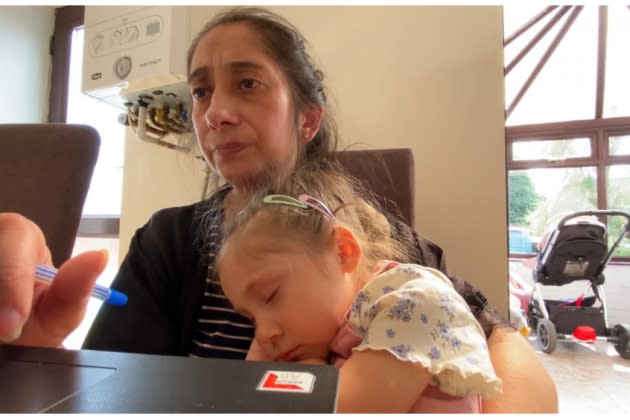‘Leaving to Remain’ Sheds Light on Challenges Facing Roma Community

Long a champion of human rights-focused work, the Ji.hlava International Documentary Film Festival screened a compelling collection of films focused on Roma inequality issues in its 26th edition.
One of the most moving, “Leaving to Remain,” which follows three Roma figures who have emigrated from Central Europe to the U.K., survived a host of challenges to become a telling story of change and possibility.
More from Variety
Lucie Králová Talks 'Playful' Ji.hlava Winner 'Kapr Code,' New Project 'Dream-Heeders'
Film Festival Programmers Debate Banning Russian Films, Facing Down Controversies
Documentary Filmmaker Joele Walinga Finds Accidental Beauty in Security Camera Footage
“I think it’s really important,” says director Mira Erdevički of the doc, which takes on the decades-old problem of Czech and Slovak public schools that segregate Roma children, forcing them into special education programs that offer minimal academics.
“When you have a system that segregates Roma kids just because they are Roma, they don’t actually get any choice,” says Erdevički. “And then they are going to be blamed because they are poor – but the poverty comes with the lower education.”
“Leaving to Remain” is the third film the director has made exploring issues facing the minority – Europe’s largest – and follows three Roma figures whose families emigrated to the U.K. years ago, enabling them to fully integrate into regular schools, after which each managed to build an impressive career.
“When you have a half a million people emigrating from the Czech Republic and Slovakia when you don’t have a war, that’s really telling you something about what they’re facing.”
What’s more, the doc’s subjects are also committed to helping others like themselves, says Erdevički.
When asked why they’re emigrating to the U.K., says the director, most Roma who have moved will say it’s to give their kids a chance at a good education.
“I think the film is about what it means when you do have an education – what is your perspective and how does it change your personal success. But also how do you help your community.”
One of the film’s subjects, Denisa, a busy mother who has managed to finish law school, works in a legal aid organization, helping immigrants get their asylum and residence papers in order. As she scrambles to deal with mind-boggling bureaucracy and deadlines that threaten to shut people out of legal status in the U.K. in the wake of Brexit, the clock counts down and Denisa struggles to keep calm and focused.
Her son, Hynek, documents her balancing act – and not a few arguments with her – with increasingly confidence and creative camera work, shooting on a hand-held iPhone.
When COVID made it impossible for film crews to shoot the film subjects directly, Erdevički says, she got small 4K cameras into their hands and worked closely with them daily, offering technical feedback on how best to film their lives.
The coaching paid off, with powerful scenes of personal struggles caught by her subjects, who filmed spontaneous moments of both lightness and angst from their lives.
“Leaving to Remain” grew out of the filmmakers’ curiosity about Roma children whose parents had emigrated to the U.K., allowing their children to thrive in a British multicultural society with access to inclusive education.
Their lives stand in stark contrast to those of Roma children in their home countries, who remain stuck in a system that sidelines them years after European human rights courts ruled that Czech and Slovak schools must end systematic segregation.
After extensive research, the “Leaving to Remain” filmmakers found their three protagonists in the English towns of Leicester and Peterborough.
Petr, who became a police officer, won an MBE for his community cohesion work between Roma and non-Roma communities. He arrived in the U.K. with his family in the 90s after he and his mother were victims of skinhead attacks to which Czech police turned a blind eye.
After leaving the police, Petr decides to devote his life to community work in his new home.
Denisa, the attorney, was the only one in her family to receive a mainstream education while still in the Czech Republic, but then found that even with her secondary degree she couldn’t find any work. After moving to Leicester and taking a job as a cleaner, she trained to become a fully qualified lawyer specializing in social welfare cases.
The family of Ondrej, who was sent to a special-needs school in his native Slovakia because he was Roma, were motivated to move to the U.K. over the incident. Their son then received his secondary education at Babington Academy in Leicester where he flourished despite his initial lack of English. After completing his bachelor’s degree with honors in psychology, he studies for his master’s degree, while also supporting his family and starting one of his own.
But the film captures more than a stunning contrast in opportunities, says the director – it also shows that her subjects’ courage and determination are just as essential. “You need to have critical ambition and the need to have your voice heard,” says Erdevički.
The producers, Lucie Wenigerová, Zuzana Mistríková and Martin Jůza, structured the film as a U.K.-Slovak-Czech coproduction with support from Czech and Slovak public broadcasters, the Czech and Slovak film funds and the Slovak Kult Minor Fund.
Best of Variety
Sign up for Variety’s Newsletter. For the latest news, follow us on Facebook, Twitter, and Instagram.

 Yahoo Movies
Yahoo Movies 